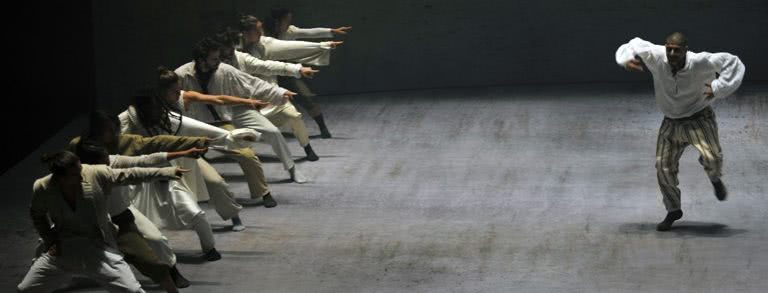World-renowned choreographer Hofesh Shechter is returning to the Sydney Opera House this month with his latest work,Sun. An exploration of the duality of nature and humanity,Sunwill take audiences on a journey that’s visually stunning, but also question the world as we know it.
“Sun had its premiere almost a year ago and it had a bit of an evolution during its run,” Shechter tells the BRAG. “I can now comfortably say that Sun is about dealing with the aftermath of a colonial world and the fallout of colonisation. It asks uncomfortable questions on the stage and deals with reality. On the surface, everything is visually beautiful but we slowly learn that something dark is bubbling underneath.”
Despite the seemingly unambiguous title, Shechter argues there’s a deeper meaning to the performance, particularly in regards to land.
“The title can carry so many meanings. The sun can carry life, but also danger. For me, because Hebrew is my first language, the word ‘sun’ is also related to the idea of territory – a place under the sun and people finding their place on Earth. The title will do different things to different people. I know that for some audience members there is something that is very empowering about the piece, but for some others it can feel very challenging. It’s the different sides to Sun that I really love.”
Shechter is known for presenting overtly dark and serious topics on his stage. Compared to his other work, Sun is subtler, but it’s also a terrifyingly accurate depiction of the Western world in particular.
“Sun is not a statement, it’s me responding to the world the way that I see it,” he says. “I live in London, which is a place with beautiful parks, houses and cars. We are richer than we could imagine and we have everything that we could ever need to live for a thousand years. But if you start scratching the surface and asking, ‘Why are we so, so rich? Where does it all come from?’ very quickly and very easily you’ll find answers that are pretty scary. They always involve acts of war and murder. But we don’t ask these questions, which is why I think it’s interesting to bring a piece like this to Australia. It’s not by chance that we all speak English and can understand each other.”
Although one might assume from Shechter’s words that his inspiration for the piece may have stemmed from a particular world event, it actually came more from a time of inward retrospection.
“I suppose it was something that happened in my life; the search for more and more comfort and then asking, ‘Why?’ It was an alteration rather than being inspired by one event. It was a general thought that floated around in my mind during that period.”
In addition to choreographing the piece, Shechter was also involved in the musical composition, an equally demanding role.
“It’s very challenging and time-demanding [to do both], but also rewarding. I think I’d rather have these little inner arguments with myself than with someone else. It also depends on the moment. You have moments of inspiration where you’re just writing it and loving it but actually putting it together is a lot of hard work. It’s such a meaningful and powerful thing, and I’m happy to pay the price of the sleepless nights and the endless energy you have to have. I kind of hate it, but when it’s done it’s great.”
Sunis being performed at theDrama Theatre, Sydney Opera House fromWednesday August 27 to Saturday August 30, tickets available online.


































